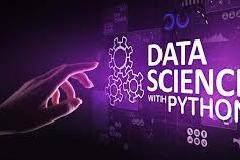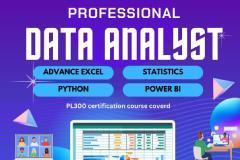This comprehensive course is designed for individuals with no prior coding experience who are interested in entering the field of data science. Over the span of three months, participants will learn the fundamentals of Python programming and its application in data science. They will gain proficiency in data manipulation, visualization, and analysis using Python libraries such as NumPy, Pandas, and Matplotlib. Additionally, the course covers the basics of data science, including data preprocessing, exploratory data analysis, and introductory machine learning concepts, providing a solid foundation for further study in the field.
Month 1: Python Fundamentals
Week 1:
- Introduction to Python programming
- Variables, data types, and basic operations
- Control structures: loops and conditionals
Week 2:
- Functions and modules
- File handling and input/output operations
- Error handling and exceptions
Week 3:
- Introduction to Python libraries for data science (NumPy, Pandas, Matplotlib)
- Working with arrays and matrices using NumPy
- Data manipulation and analysis with Pandas
Week 4:
- Data visualization with Matplotlib
- Plotting basic charts and graphs
- Customizing visualizations and adding labels
Month 2: Data Preprocessing and Exploratory Data Analysis
Week 5:
- Introduction to data preprocessing
- Handling missing values and outliers
- Data cleaning and transformation techniques
Week 6:
- Data normalization and scaling
- Feature encoding and categorical data handling
- Introduction to feature selection and dimensionality reduction
Week 7:
- Exploratory data analysis (EDA)
- Descriptive statistics and data summarization
- Visualizing relationships and distributions in data
Week 8:
- Advanced data visualization techniques
- Plotting advanced charts (heatmaps, scatter plots, etc.)
- EDA using Pandas and visualization libraries
Month 3: Introduction to Machine Learning
Week 9:
- Introduction to machine learning concepts
- Supervised vs. unsupervised learning
- Training and test datasets
Week 10:
- Regression analysis and linear regression models
- Evaluation metrics for regression models
- Implementing regression models in Python
Week 11:
- Classification algorithms and logistic regression
- Evaluation metrics for classification models
- Implementing classification models in Python
Week 12:
- Introduction to clustering algorithms
- K-means clustering and hierarchical clustering
- Introduction to model evaluation and selection
Note: This syllabus provides a general outline for the Python for Data Science and Basics of Data Science course. The duration and content can be adjusted based on the pace of the learners and the depth of coverage desired. Additional topics such as data visualization libraries (Seaborn, Plotly) or intermediate machine learning concepts can be included if time permits.







